Unit5 fourteen steps
新世纪综合英语第二版unit5fourteensteps教案
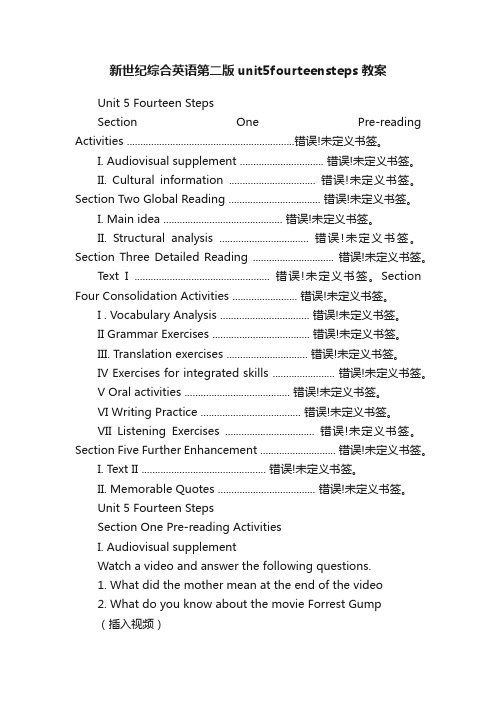
新世纪综合英语第二版unit5fourteensteps教案Unit 5 Fourteen StepsSection One Pre-reading Activities ..............................................................错误!未定义书签。
I. Audiovisual supplement ............................... 错误!未定义书签。
II. Cultural information ................................ 错误!未定义书签。
Section Two Global Reading .................................. 错误!未定义书签。
I. Main idea ............................................ 错误!未定义书签。
II. Structural analysis ................................. 错误!未定义书签。
Section Three Detailed Reading .............................. 错误!未定义书签。
Text I .................................................. 错误!未定义书签。
Section Four Consolidation Activities ........................ 错误!未定义书签。
I . Vocabulary Analysis ................................. 错误!未定义书签。
II Grammar Exercises .................................... 错误!未定义书签。
综合教程2Unit5_fourteen_stepsPPT课件
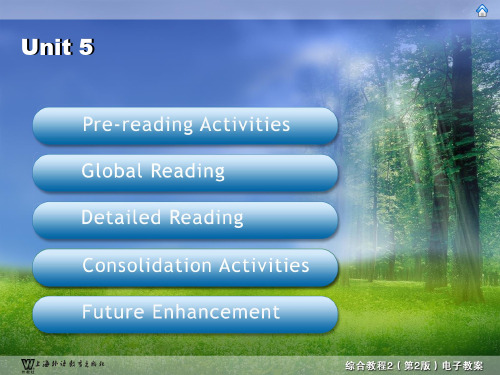
Audiovisual supplement Cultural information
Voiceover: dress up in their robes and their bedsheets and act like a bunch of ghosts or spooks or something. They’d even put bedsheets on their horses and ride around. Anyway, that’s how I got my name — Forrest Gump. Mama said the Forrest part was to remind me that sometimes we all do things that, well, that just don’t make no sense.
Audiovisual supplement Cultural information
Audiovisual supplement Cultural information
Doctor: Let’s take a little walk around. How do those feel? His legs are strong, Mrs. Gump, as strong as I’ve ever seen. But his back’s as crooked as a politician. But we’re going to straighten him right up, aren’t we, Forrest?
Audiovisual supplement Cultural information
Mother: better than you, Forrest. If God intended everybody to be the same, he’d have given us all braces on our legs.
新世纪高等院校英语专业本科生系列教材综合教程2第五单元课后答案
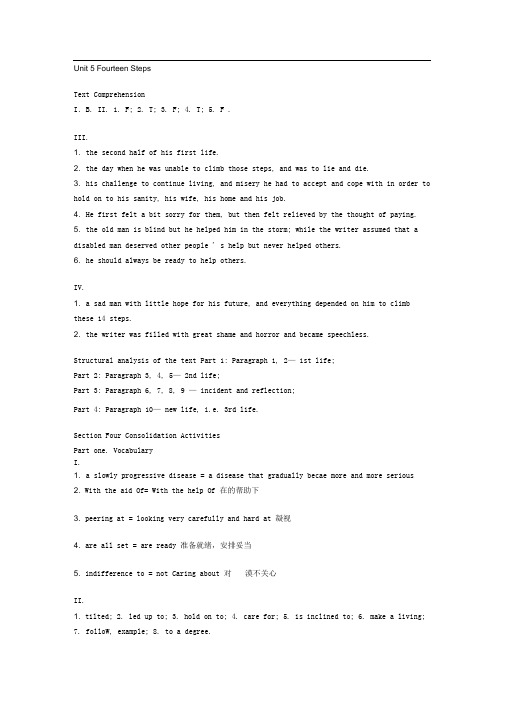
Unit 5 Fourteen StepsText ComprehensionI.B. II. 1. F; 2. T; 3. F; 4. T; 5. F .III.1. the second half of his first life.2. the day when he was unable to climb those steps, and was to lie and die.3. his challenge to continue living, and misery he had to accept and cope with in order to hold on to his sanity, his wife, his home and his job.4. He first felt a bit sorry for them, but then felt relieved by the thought of paying.5. the old man is blind but he helped him in the storm; while the writer assumed that a disabled man deserved other people ' s help but never helped others.6. he should always be ready to help others.IV.1. a sad man with little hope for his future, and everything depended on him to climb these 14 steps.2. the writer was filled with great shame and horror and became speechless.Structural analysis of the text Part 1: Paragraph 1, 2— 1st life;Part 2: Paragraph 3, 4, 5— 2nd life;Part 3: Paragraph 6, 7, 8, 9 — incident and reflection;Part 4: Paragraph 10— new life, i.e. 3rd life.Section Four Consolidation ActivitiesPart one. VocabularyI.1. a slowly progressive disease = a disease that gradually becae more and more serious2. With the aid Of= With the help Of 在的帮助下3. peering at = looking very carefully and hard at 凝视4. are all set = are ready 准备就绪,安排妥当5. indifference to = not Caring about 对漠不关心II.1. tilted;2. led up to;3. hold on to;4. care for;5. is inclined to;6. make a living;7. folloW, example; 8. to a degree.III. Word derivationFill in the blanks With the appropriate forms of the given Words.1. You always follow your own inclination (incline) instead of thinking of our feeling.2. The men stood in front of the bar, indifferent (indifference) to the argument that was going on across the road.3. The company has had a successful first year at home but penetration (penetrate) of the international market has been slow.4. We hadn ' t seen her for many years and were very shocked by hfrearilty (frail).5. He does not consider his deafness an affliction (afflict).6. We were all very impressed by the excellence (excellent) of the design.7. Her fever is getting progressively (progress) worse. I think we should call a doctor.8. The honeymoon period was soon followed by the usual disillusionment (disillusion) with day-to-day reality.1. i ncline v.使有倾向,易于;爱好inclination n. 倾向,意愿in cli ned a.有倾向的;倾斜的2. indifference n. 不重视,无兴趣,漠不关心 indifferent a. 漠不关心的,冷淡的indifferently ad. 不在乎地,冷淡地,淡然地3. penetrate v. 穿透,渗透;看穿penetrating a. 敏锐的,尖锐的;穿透的,透彻的penetration n. 渗透,侵入,突破4. frail a. 脆弱的,虚弱的frailty n. 脆弱,意志薄弱;弱点5. afflict v. 使苦恼,折磨 affliction n. 痛苦,苦恼,苦难6. excellent a. 极好的,杰出的 excellence n. 优秀,卓越,优点 excellently ad. 优秀地,超群地7. progress n. 进步,发展,前进 progression n. 前进 progressive a. 前进的,渐进的8. disillusion n. 觉醒,幻灭 disillusionment n. 幻灭感 disillusioned a. 大失所望的,幻想破灭的IV.1. A;2. C;3. B;4. D;5. B;6. A;7. D;8. B.IV. Synonym / AntonymGive a synonym or an antonym of the word underlined in each sentence in the sense it is used.1. And I managed to keep my health and optimism, to a degree, because of 14 steps. Antonym: pessimism2. Not so. Here hobbled a bitterly disillusioned cripple, a man who held on to his sanity and his wife and his home and his job because of 14 miserable steps leading up to the b ack door from his garage.Synonym: painfully, desperately3. She went into the house and a moment later came out bundled in raincoat and hat, followed by a man who called a cheerful greeting.Antonym: cheerless, unhappy , gloomy4. I started the engine and thumped slowly along, keeping well over on the shoulder untilI came to the dirt road, where I turned in — thankfully.Synonym: fortunately5. He was an old man, stooped and frail-looking under his slicker. Synonym: weak, delicate, feeble6. As I became older, I became more disillusioned and frustrated.Synonym: disappointed7. I realized that I was filled to overflowing with self-pity, selfishness, indifference to the needs of others and thoughtlessness.Antonym: selflessness, unselfishness8. There followed a long interval of noises.Synonym: periodV. Compounding Write in each space the meaning of each given word.1. likewise2. underway3. carefree4. forthcoming5. stand-by6. user-friendly7. soundproof8. landlocked in the same wayin progress with no concerncoming soon something ready for use handy to use preventing the passage of sound almost or entirely surrounded by landPart Two. Grammar Exercises1. NumeralsCardinal 基数 numerals express integer 整数 (whole) abstract numbers, or the number / amount of the determined nouns in literal form. In addition to being numerals determining nouns, cardinal numerals may also work as:1. adjectives2. nouns3. numeral — One Il Can also be a PronoUnThe different WayS to express — around around, about, nearly, some, more or less, or so, thereaboUts, etC.Ordinal 序数 numerals are used to express an / the order in a series. In addition to being numerals determining nouns, ordinal numerals may also work as:1. adjeCtives2. nouns3. adverbsOrdinal numerals allow both artiCles ahead. Again, the artiCle determines the noun only, not the numeral.FraCtional numeral is used to express parts of a whole. Commonly, it takes two forms:1. Common 普通分数 /简分数 fraCtionWork aCCording to the formula: Wholes + Numerator / Denominatore. g. 1 2/3 = (is equal to or means) one (whole) and / plus two thirdsNote the — S Il added to the denominator: — thirds II.2. DeCimal 小数 numbersWork aCCording to the formula: Whole numbers (point) deCimalse. g. 12.15 = (is equal to or means) twelve fifteen, or twelve point fifteenI . different WayS to ex PreSS — around II.I. About 100 students; 2. more or less 40 pages; 3. There are 30 or so questions; 4. two hours or thereabouts; 5. some four miles; 6. 50ish.II.1. a nap 合一会儿眼 ;2. very good indeed 百里挑一 ;3. in a mess 乱七八糟 ;4. on hands and knees 四脚爬 ;5. very muCh better than you are 比你强十倍 ;6. talking quiCkly and Continuously;7. very probably 十有八九 ;8. a lot Ways 千万条路子 .II. CorreCt the errors in the folloWing sentenCes.1. He Was not due at the offiCe for another three-quarter (attributive-adjeCtive) (three quarters) of an hour.2. WaS were.3. This is the Worst disaster I Can remember in my plus 25 years (25 years plus) as apoliCe offiCer.4. SeC Ond time -a SeC Ond time.5. See -have See n. (PreSe nt PerfeCt)6. It took him one and a half hours to finish the task.7. TWenty-nine (beginning)2. Determiners (both, each, either or neither, some, any)Determiners are used in front of nouns to indicate whether you are referring to something specific or something of a particular type.Both is used to indicate that the action or state denoted by the verb applies individually to each of the two entities. When both is used with and to link parallel elements in a sentence, the words or phrases that follow them should correspond grammatically. Both can only collocate with plural count nouns.e. g. Both her fingers are broken.Both Mary and Tom like reading English novels.The phrase beginning with each identifies a set of items wherein the words following each identify the individual elements by their shared characteristics. The phrase is grammatically singular in number, so if the phrase is the subject of a sentence, its verb is conjugated into a third-person singular form. Similarly, any pronouns that refer to the noun phrase are singular.e. g. Each candidate has 49 votes.Each voter must decide for herself.Either and neither are used in sentences concerning a possible choice between two items. Either can mean one or the other (of two) or each of two.e.g. I ' ve got tea and coffee, so you can have either.e(o nr the other)The room has a door at either end. (both)Neither means not the first one and not the second one.e. g. Neither of the students were listening.Both, some and any appear before nouns. Some and any may be used with countable and uncountable nouns.e. g. He bought some sandwiches for lunch.He didn ' t see any stars when he visited Hollywood.He ate some cheese with his sandwiches.He never drinks any coffee at night because then he can ' t sleep.IV.Both, both, Neither, either, neither. both, each, either.V. Fill in each of the blanks with some, any or one of their compounds.1. somewhat2. The repairs will cost _____________ something in the region of $500.3. I was amazed that __ some ____ 400 people came to the meeting to discuss the new schemefor a shopping center.4. somehow, anything5. anything, something6. George ought to be able to tell whether that old plate is valuable. He is___something___ of anexpert on china.7. What have you been up to? I havent seen ___anythiungfo_r_a_goefsy.o8. someVI.1. In spite of + noun--2. It seemed to me that + clause-Part Three. Translation exercisesI. English to Chinese1. 常言道猫有九命,我信这话。
2-Unit5 Fourteen Steps答案综合教程二
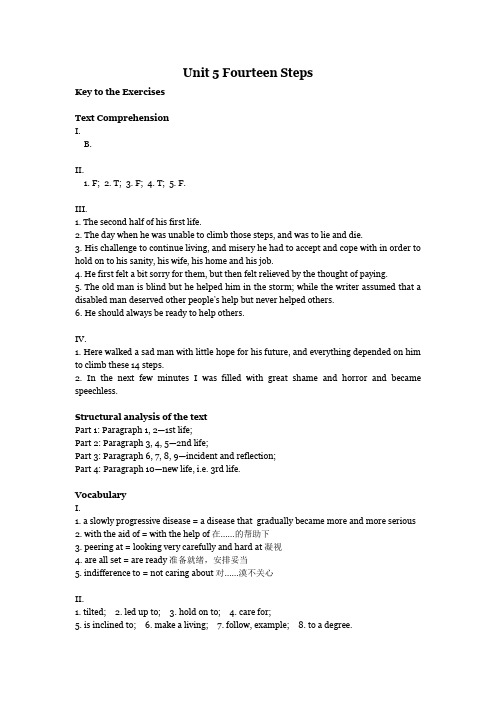
Unit 5 Fourteen StepsKey to the ExercisesText ComprehensionI.B.II.1. F;2. T;3. F;4. T;5. F.III.1. The second half of his first life.2. The day when he was unable to climb those steps, and was to lie and die.3. His challenge to continue living, and misery he had to accept and cope with in order to hold on to his sanity, his wife, his home and his job.4. He first felt a bit sorry for them, but then felt relieved by the thought of paying.5. The old man is blind but he helped him in the storm; while the writer assumed that a disabled man deserved other people’s help but never helped others.6. He should always be ready to help others.IV.1. Here walked a sad man with little hope for his future, and everything depended on him to climb these 14 steps.2. In the next few minutes I was filled with great shame and horror and became speechless.Structural analysis of the textPart 1: Paragraph 1, 2—1st life;Part 2: Paragraph 3, 4, 5—2nd life;Part 3: Paragraph 6, 7, 8, 9—incident and reflection;Part 4: Paragraph 10—new life, i.e. 3rd life.VocabularyI.1. a slowly progressive disease = a disease that gradually became more and more serious2. with the aid of = with the help of 在……的帮助下3. peering at = looking very carefully and hard at 凝视4. are all set = are ready 准备就绪,安排妥当5. indifference to = not caring about 对……漠不关心II.1. tilted;2. led up to;3. hold on to;4. care for;5. is inclined to;6. make a living;7. follow, example;8. to a degree.III. Word derivationFill in the blanks with the appropriate forms of the given words.1. inclination2. indifferent3. penetration4. frailty5. affliction6. excellence7. progressively8. disillusionmentIV.1. A;2. C;3. B;4. D;5. B;6. A;7. D;8. B.V. Synonym / AntonymGive a synonym or an antonym of the word underlined in each sentence in the sense it is used.1. Antonym: pessimism2. Synonym: painfully, desperately3. Antonym: cheerless, unhappy, gloomy4. Synonym: fortunately5. Synonym: weak, delicate, feeble6. Synonym: disappointed7. Antonym: selflessness, unselfishness8. Synonym: periodVI. CompoundingWrite in each space the meaning of each given word.1. likewise in the same way2. underway in progress3. carefree with no concern4. forthcoming coming soon5. stand-by something ready for use6. user-friendly handy to use7. soundproof preventing the passage of sound8. landlocked almost or entirely surrounded by landGrammar ExercisesI. D ifferent ways to express “around”.1. About 100 students;2. more or less 40 pages;3. There are 30 or so questions;4. two hours or thereabouts;5. some four miles;6. 50ish.II.1. a nap合一会儿眼;2. very good indeed百里挑一;3. in a mess乱七八糟;4. on hands and knees四脚爬;5. very much better than you are比你强十倍;6. talking quickly and continuously;7. very probably十有八九;8. a lot ways千万条路子.III. Correct the errors in the following sentences.1. three-quarter → three quarters2. was → were.3. plus 25 years →25 years plus4. second time → a second time5. see → have seen6. hour → hours7. Twenty-nine (beginning)IV.Both, both, Neither, either, neither.both, each, either.V. Fill in each of the blanks with some, any or one of their compounds.1. somewhat2. something3. some4. somehow, anything5. anything, something6. something7. anything8. someTranslation exercisesI. English to Chinese1. 常言道猫有九命,我信这话。
(完整版)Unit5FourteenSteps课文翻译综合教程二
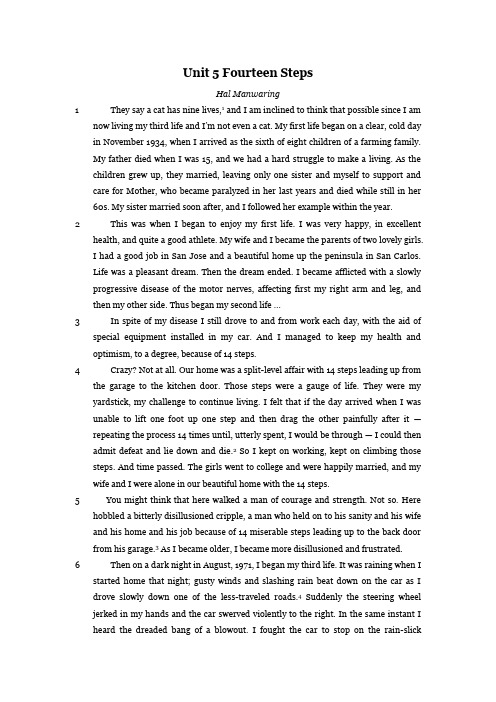
Unit 5 Fourteen StepsHal Manwaring1They say a cat has nine lives,1 and I am inclined to think that possible since I am now living my third life and I’m not even a cat. My first life began on a clear, cold day in November 1934, when I arrived as the sixth of eight children of a farming family.My father died when I was 15, and we had a hard struggle to make a living. As the children grew up, they married, leaving only one sister and myself to support and care for Mother, who became paralyzed in her last years and died while still in her 60s. My sister married soon after, and I followed her example within the year.2This was when I began to enjoy my first life. I was very happy, in excellent health, and quite a good athlete. My wife and I became the parents of two lovely girls.I had a good job in San Jose and a beautiful home up the peninsula in San Carlos.Life was a pleasant dream. Then the dream ended. I became afflicted with a slowly progressive disease of the motor nerves, affecting first my right arm and leg, and then my other side. Thus began my second life …3In spite of my disease I still drove to and from work each day, with the aid of special equipment installed in my car. And I managed to keep my health and optimism, to a degree, because of 14 steps.4Crazy? Not at all. Our home was a split-level affair with 14 steps leading up from the garage to the kitchen door. Those steps were a gauge of life. They were my yardstick, my challenge to continue living. I felt that if the day arrived when I was unable to lift one foot up one step and then drag the other painfully after it —repeating the process 14 times until, utterly spent, I would be through — I could then admit defeat and lie down and die.2So I kept on working, kept on climbing those steps. And time passed. The girls went to college and were happily married, and my wife and I were alone in our beautiful home with the 14 steps.5You might think that here walked a man of courage and strength. Not so. Here hobbled a bitterly disillusioned cripple, a man who held on to his sanity and his wife and his home and his job because of 14 miserable steps leading up to the back door from his garage.3 As I became older, I became more disillusioned and frustrated.6Then on a dark night in August, 1971, I began my third life. It was raining when I started home that night; gusty winds and slashing rain beat down on the car as I drove slowly down one of the less-traveled roads.4Suddenly the steering wheel jerked in my hands and the car swerved violently to the right. In the same instant I heard the dreaded bang of a blowout. I fought the car to stop on the rain-slickshoulder of the road and sat there as the enormity of the situation swept over me.5 It was impossible for me to change that tire! Utterly impossible! A thought that a passing motorist might stop was dismissed at once. Why should anyone? I knew I wouldn’t! Then I remembered that a short distance up a little side road was a house.I started the engine and thumped slowly along, keeping well over on the shoulderuntil I came to the dirt road, where I turned in —thankfully. Lighted windows welcomed me to the house and I pulled into the driveway and honked the horn.7The door opened and a little girl stood there, peering at me. I rolled down the window and called out that I had a flat tire and needed someone to change it for me because I had a crutch and couldn’t do it myself. She went into the house and a moment later came out bundled in raincoat and hat, followed by a man who called a cheerful greeting. I sat there comfortable and dry, and felt a bit sorry for the man and the little girl working so hard in the storm. Well, I would pay them for it. The rain seemed to be slackening a bit now, and I rolled down the window all the way to watch. It seemed to me that they were awfully slow and I was beginning to become impatient. I heard the clank of metal from the back of the car and the little girl’s voice came clearly to me. “Here’s the jack-handle, Grandpa.” She was answered by the murmur o f the man’s lower voice and the slow tilting of the car as it was jacked up.6There followed a long interval of noises, jolts and low conversation from the back of the car, but finally it was done. I felt the car bump as the jack was removed, and I heard the slam of the truck lid, and then they were standing at my car window. 8He was an old man, stooped and frail-looking under his slicker. The little girl was about eight or ten, I judged, with a merry face and a wide smile as she looked up at me. He said, “This is a bad night for car trouble, but you’re all set now.” “Thanks,”I said. “How much do I owe you?” He shook his head. “Nothing. Cynthia told me youwere a cripple —on crutches. Glad to be of help. I know you’d do the same for me.There’s no charge, friend.” I held out a five-dollar bill. “No! I like to pay my way.” He made no effort to take it and the little girl stepped closer to the window and said quietly, “Grandpa can’t see it.”9In the next few frozen seconds the shame and horror of that moment penetrated and I was sick with an intensity I had never felt before.7 A blind man and a child!Fumbling, feeling with cold, wet fingers for bolts and tools in the dark — a darkness that for him would probably never end until death. I don’t remember h ow long I sat there after they said good night and left me, but it was long enough for me to search deep within myself and find some disturbing traits. I realized that I was filled tooverflowing with self-pity, selfishness, indifference to the needs of others and thoughtlessness.8 I sat there and said a prayer.10“Therefore all things whatsoever ye would that men should do to you, do ye even so to them: for this is the law and the prophets.”9To me now, months later, this Scriptural admonition is more than just a passage in the Bible. It is a way of life, one that I am trying to follow. It isn’t always easy. Sometimes it is frustrating, sometimes expensive in both time and money, but the value is there. I am trying now not only to climb 14 steps each day, but in my small way to help others. Someday, perhaps, I will change a tire for a blind man in a car — someone as blind as I had been.14级台阶人们说猫有9条命, 我倾向于认为这是可能的, 因为我现在活的是第三次生命, 而我不是猫。
Unit-5-Fourteen-steps解析
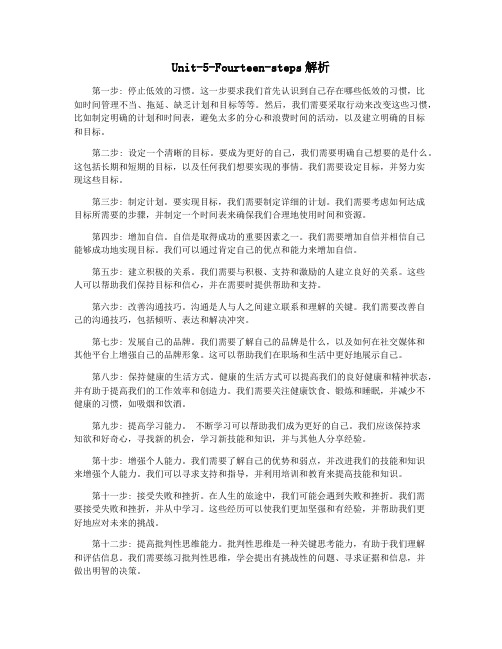
Unit-5-Fourteen-steps解析第一步: 停止低效的习惯。
这一步要求我们首先认识到自己存在哪些低效的习惯,比如时间管理不当、拖延、缺乏计划和目标等等。
然后,我们需要采取行动来改变这些习惯,比如制定明确的计划和时间表,避免太多的分心和浪费时间的活动,以及建立明确的目标和目标。
第二步: 设定一个清晰的目标。
要成为更好的自己,我们需要明确自己想要的是什么。
这包括长期和短期的目标,以及任何我们想要实现的事情。
我们需要设定目标,并努力实现这些目标。
第三步: 制定计划。
要实现目标,我们需要制定详细的计划。
我们需要考虑如何达成目标所需要的步骤,并制定一个时间表来确保我们合理地使用时间和资源。
第四步: 增加自信。
自信是取得成功的重要因素之一。
我们需要增加自信并相信自己能够成功地实现目标。
我们可以通过肯定自己的优点和能力来增加自信。
第五步: 建立积极的关系。
我们需要与积极、支持和激励的人建立良好的关系。
这些人可以帮助我们保持目标和信心,并在需要时提供帮助和支持。
第六步: 改善沟通技巧。
沟通是人与人之间建立联系和理解的关键。
我们需要改善自己的沟通技巧,包括倾听、表达和解决冲突。
第七步: 发展自己的品牌。
我们需要了解自己的品牌是什么,以及如何在社交媒体和其他平台上增强自己的品牌形象。
这可以帮助我们在职场和生活中更好地展示自己。
第八步: 保持健康的生活方式。
健康的生活方式可以提高我们的良好健康和精神状态,并有助于提高我们的工作效率和创造力。
我们需要关注健康饮食、锻炼和睡眠,并减少不健康的习惯,如吸烟和饮酒。
第九步: 提高学习能力。
不断学习可以帮助我们成为更好的自己。
我们应该保持求知欲和好奇心,寻找新的机会,学习新技能和知识,并与其他人分享经验。
第十步: 增强个人能力。
我们需要了解自己的优势和弱点,并改进我们的技能和知识来增强个人能力。
我们可以寻求支持和指导,并利用培训和教育来提高技能和知识。
第十一步: 接受失败和挫折。
Unit 5 Fourteen Steps课文翻译综合教程二
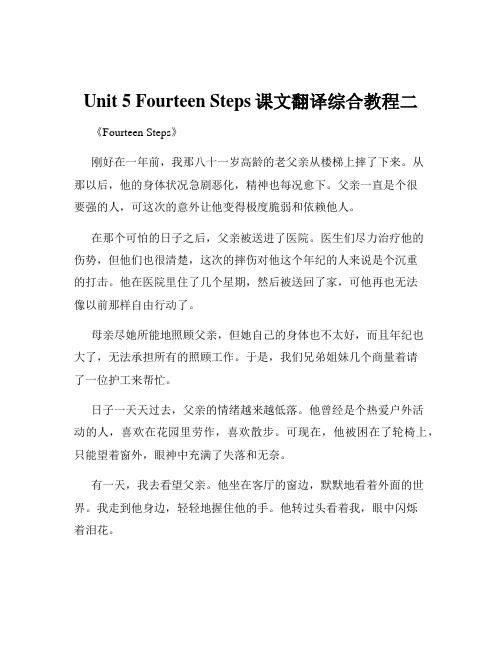
Unit 5 Fourteen Steps课文翻译综合教程二《Fourteen Steps》刚好在一年前,我那八十一岁高龄的老父亲从楼梯上摔了下来。
从那以后,他的身体状况急剧恶化,精神也每况愈下。
父亲一直是个很要强的人,可这次的意外让他变得极度脆弱和依赖他人。
在那个可怕的日子之后,父亲被送进了医院。
医生们尽力治疗他的伤势,但他们也很清楚,这次的摔伤对他这个年纪的人来说是个沉重的打击。
他在医院里住了几个星期,然后被送回了家,可他再也无法像以前那样自由行动了。
母亲尽她所能地照顾父亲,但她自己的身体也不太好,而且年纪也大了,无法承担所有的照顾工作。
于是,我们兄弟姐妹几个商量着请了一位护工来帮忙。
日子一天天过去,父亲的情绪越来越低落。
他曾经是个热爱户外活动的人,喜欢在花园里劳作,喜欢散步。
可现在,他被困在了轮椅上,只能望着窗外,眼神中充满了失落和无奈。
有一天,我去看望父亲。
他坐在客厅的窗边,默默地看着外面的世界。
我走到他身边,轻轻地握住他的手。
他转过头看着我,眼中闪烁着泪花。
“孩子,”他声音颤抖地说,“我觉得自己就像个废人。
我连自己走到厕所都做不到。
”我的心一阵刺痛,我不知道该如何安慰他。
我只能紧紧地握住他的手,告诉他我们都爱他,会一直在他身边。
过了几天,我突然有了一个想法。
我决定在我们家的楼梯上安装一些扶手,这样也许父亲能够试着重新练习走路。
我找来了工具和材料,开始动手安装扶手。
这并不是一项简单的工作,但我心里充满了希望。
当扶手终于安装好的时候,我兴奋地跑到父亲的房间,告诉他这个好消息。
父亲看着我,眼中闪过一丝惊喜。
“真的吗?也许我可以试试看。
”我小心翼翼地把父亲从轮椅上扶起来,让他靠着扶手慢慢地站起来。
他的腿在颤抖,但他的眼神中充满了坚定。
“一步,两步……”我在旁边轻声地数着。
父亲艰难地迈出了第一步,然后是第二步。
每一步都像是一场巨大的胜利。
“十三步,十四步!”当父亲终于走到楼梯的尽头时,我忍不住欢呼起来。
unit5 fourteen steps
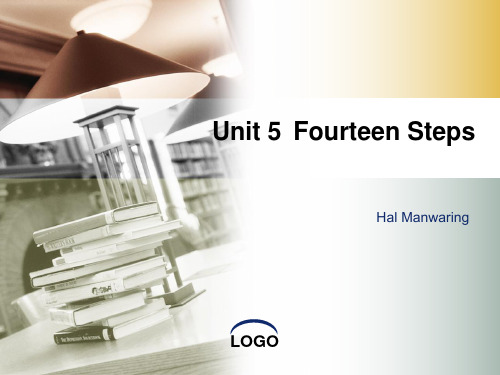
unit 5 fourteen steps
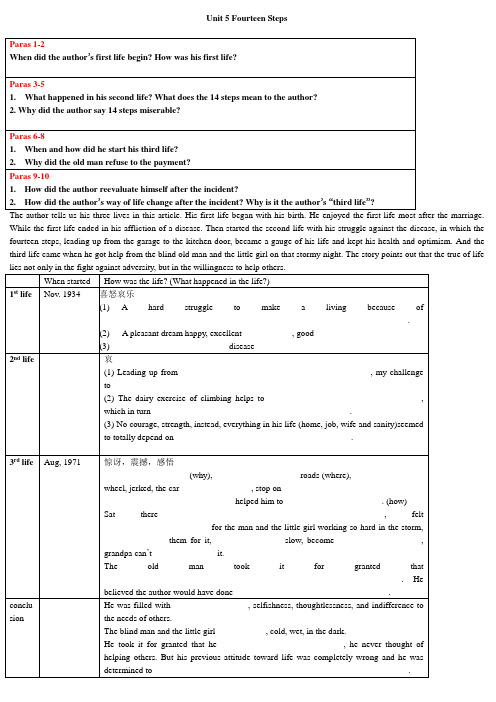
He was filled with _________________, selfishness, thoughtlessness, and indifference to the needs of others.
The blind man and the little girl ___________, cold, wet, in the dark.
(2) The dairy exercise of climbing helps to ___________________________________, which in turn _____________________________________________.
(3) No courage, strength, instead, everything in his life (home, job, wife and sanity)seemed to totally depend on ________________________________________.
1.How did the author reevaluate himself after the incident?
2.How did the author’s way of life change after the incident? Why is it the author’s “third life”?
Unit 5Fourteen Steps
Paras 1-2
When did the author’s first life begin? How was his first life?
Paras 3-5
Unit-5-Fourteen-Steps

Warm-up Discussion
• Can an invalid lead a happy life? And how?
Disability Etiquette
“Do not assume…”:
“…a person with a disability either wants or requires assistance.”
• Ex. The blizzard in south China in early 2023 paralyzed the transportation systems of
• many cities.
*
• Afflict: (passive) to cause severe suffering or pain
South Africa.
• Through (with): you have finished using sth or have ended a relationship with sb;
Ex. Are you through with that newspaper?
Ex. Todd and I are through.
• Paralyze: to cause to be unable to move;
•
(figuratively) to make sth unable to operate
normally;
• Ex. The power failure left the whole city paralyzed.
life, and is thus seeking pity.” “…that when a person with a disability is in a public
新世纪综合英语(英专)第二版unit5fourteensteps教案word

Unit 5 Fourteen StepsSection One Pre-reading Activities (2)I. Audiovisual supplement (2)II. Cultural information (2)Section Two Global Reading (3)I. Main idea (3)II. Structural analysis (3)Section Three Detailed Reading (4)Text I (4)Section Four Consolidation Activities (14)I . Vocabulary Analysis (14)II Grammar Exercises (17)III. Translation exercises (19)IV Exercises for integrated skills (20)V Oral activities (21)VI Writing Practice (21)VII Listening Exercises (22)Section Five Further Enhancement (25)I. Text II (25)II. Memorable Quotes (27)Unit 5 Fourteen StepsSection One Pre-reading ActivitiesI. Audiovisual supplementWatch a video and answer the following questions.1. What did the mother mean at the end of the video2. What do you know about the movie Forrest Gump(插入视频)Answers to the Questions:1. She was trying to tell her boy that everybody should be treated equally, even for those who had some physical or intelligence problems.2. Forrest Gump is a 1994 film based on Winston Groom’s 1986 novel of the same name. The film, directed by Robert Zemeckis, stars Tom Hanks, Robin Wright Penn, and Gary Sinise. The story is of Forrest Gump, an ordinary man who comes from Alabama and his journey through life meeting historical figures, influencing popular culture, and experiencing firsthand historic events of the late 20th century.Script:Doctor: Let’s take a little walk around. How do those feel His legs are strong, Mrs. Gump, as strong as I’veever seen. But his back’s as crooked as a politician.But we’re going to straighten him right up, aren’twe, ForrestMother: Forrest!Voiceover:Now, when I was a baby, Mama named me after the great Civil War hero General Nathan Bedford Forrest. Shesaid we was related to him in some way. What he didwas, he started up this club called the Ku Klux Klan.They’d all dress up in their robes and theirbedsheets and act like a bunch of ghosts or spooksor something. They’d even put bedsheets on theirhorses and ride around. Anyway, that’s how I got myname —Forrest Gump. Mama said the Forrest part wasto remind me that sometimes we all do things that,well, that just don’t make no sense.Mother: All right. What are y’all staring at Haven’t you ever seen a little boy with braces on his legs beforeDon’t ever let anybody tell you they’re better thanyou, Forrest. If God intended everybody to be thesame, he’d have given us all braces on our legs. Voiceover: Mama always had a way of explaining things so I could understand them.II. Cultural information1. QuoteI am quite often asked: How do you feel about having ALS The answer is, not a lot. I try to lead as normal a life as possible, and not think about my condition, or regret the things it prevents me from doing, which are not that many.—Stephen Hawking(适当位置插入图片Stephen Hawking)Section Two Global ReadingI. Main ideaIt is hard to imagine that a blind old man should be willing and able to fix a car for someone else on a dark stormy night. This happened to the author, a crippled man who was afflicted by a progressive disease and who took others’help for granted. Up to that day, the author had lived in disillusionment, self-pity, indifference and selfishness, as he was becoming increasingly feeble. He struggled to climb the fourteen steps every day only to hold on to his sanity, his wife, his home andhis job. After he met the blind old man, it suddenly dawned on him that even a handicapped person was capable of performing an act of love for his fellow beings, and that was where the value of life lies.II. Structural analysis1.How many parts can the text be divided into and what’s thetopic of each partAccording to the development of the story, the text could be divided into four parts, each of which focuses on one topic.Respectively, these topics are about the author’s first life, his second life, his third life and his reflection on the auto-repair incident.2.Summarize the main idea of each part by completing the table.Section Three Detailed ReadingText IFourteen StepsHal Manwaring1 They say a cat has nine lives,1and I am inclined to thinkthat possible since I am now living my third life and I’m not even a cat. My first life began on a clear, cold day in November 1934, when I arrived as the sixth of eight children of a farming family. My father died when I was 15, and we had a hard struggle to make a living. As the children grew up, they married, leaving only one sister and myself to support and care for Mother, who became paralyzed in her last years and died while still in her 60s. My sister married soon after, and I followed her example within the year.2 This was when I began to enjoy my first life. I was veryhappy, in excellent health, and quite a good athlete. My wife and I became the parents of two lovely girls. I had a good job in San Jose and a beautiful home up the peninsula in San Carlos. Life was a pleasant dream. Then the dream ended. I became afflicted with a slowly progressive disease of themotor nerves, affecting first my right arm and leg, and then my other side. Thus began my second life …3 In spite of my disease I still drove to and from workeach day, with the aid of special equipment installed in my car. And I managed to keep my health and optimism, to a degree, because of 14 steps.4 Crazy Not at all. Our home was a split-level affair with14 steps leading up from the garage to the kitchen door.Those steps were a gauge of life. They were my yardstick, my challenge to continue living. I felt that if the day arrived when I was unable to lift one foot up one step and then drag the other painfully after it — repeating the process 14 times until, utterly spent, I would be through —I could then admit defeat and lie down and So I kept on working, kept on climbing those steps. And time passed. The girls went to college and were happily married, and my wife and I were alone in our beautiful home with the 14 steps.5 You might think that here walked a man of courage andstrength. Not so. Here hobbled a bitterly disillusioned cripple, a man who held on to his sanity and his wife and his home and his job because of 14 miserable steps leadingup to the back door from his As I became older, I became more disillusioned and frustrated.6 Then on a dark night in August, 1971, I began my thirdlife. It was raining when I started home that night; gusty winds and slashing rain beat down on the car as I drove slowly down one of the less-traveled Suddenly the steering wheel jerked in my hands and the car swerved violently to the right.In the same instant I heard the dreaded bang of a blowout.I fought the car to stop on the rain-slick shoulder of theroad and sat there as the enormity of the situation swept over It was impossible for me to change that tire! Utterly impossible! A thought that a passing motorist might stop was dismissed at once. Why should anyone I knew I wouldn’t! ThenI remembered that a short distance up a little side road wasa house. I started the engine and thumped slowly along,keeping well over on the shoulder until I came to the dirt road, where I turned in —thankfully. Lighted windows welcomed me to the house and I pulled into the driveway and honked the horn.7 The door opened and a little girl stood there, peeringat me. I rolled down the window and called out that I hada flat tire and needed someone to change it for me becauseI had a crutch and couldn’t do it myself. She went into thehouse and a moment later came out bundled in raincoat and hat, followed by a man who called a cheerful greeting. I sat there comfortable and dry, and felt a bit sorry for the man and the little girl working so hard in the storm. Well, I would pay them for it. The rain seemed to be slackening a bit now, and I rolled down the window all the way to watch.It seemed to me that they were awfully slow and I was beginning to become impatient. I heard the clank of metal from the back of the car and the little girl’s voice came clearly to me. “Here’s the jack-handle, Grandpa.”She was answered by the murmur of the man’s lower voice and the slow tilting of the car as it was jacked There followed a long interval of noises, jolts and low conversation from the back of the car, but finally it was done. I felt the car bump as the jack was removed, and I heard the slam of the truck lid, and then they were standing at my car window.8 He was an old man, stooped and frail-looking under hisslicker. The little girl was about eight or ten, I judged, with a merry face and a wide smile as she looked up at me.He said, “This is a bad night for car trouble, but you’reall set now.”“Thanks,”I said. “How much do I owe you”He shook his head. “Nothing. Cynthia told me you were a cripple — on crutches. Glad to be of help. I know you’d do the same for me. There’s no charge, friend.”I held outa five-dollar bill. “No! I like to pay my way.” He madeno effort to take it and the little girl stepped closer to the window and said quietly, “Grandpa can’t see it.”9 In the next few frozen seconds the shame and horror ofthat moment penetrated and I was sick with an intensity I had never felt before.7 A blind man and a child! Fumbling, feeling with cold, wet fingers for bolts and tools in the dark — a darkness that for him would probably never end until death. I don’t remember how long I sat there after they said good night and left me, but it was long enough for me to search deep within myself and find some disturbing traits. I realized that I was filled to overflowing with self-pity, selfishness, indifference to the needs of others and I sat there and said a prayer.10“Therefore all things whatsoever ye would that men should do to you, do ye even so to them: for this is the law and the prophets.”9To me now, months later, this Scripturaladmonition is more than just a passage in the Bible. It isa way of life, one that I am trying to follow. It isn’talways easy. Sometimes it is frustrating, sometimes expensive in both time and money, but the value is there.I am trying now not only to climb 14 steps each day, but inmy small way to help others. Someday, perhaps, I will changea tire for a blind man in a car —someone as blind as I hadbeen.Paragraphs 1-2Questions:1. What can we infer about the author’s childhood (Paragraph 1)We can infer that he lived an unhappy and hard life in his childhood because of the early death of his father and the poor health of his mother.2. How did his second life begin (Paragraph 2)His second life began when he was afflicted with a slowly progressive disease of the motor nerves, affecting first hisright arm and leg, and then his other side.Words and Expressions1. be inclined to be likely or tend to do sth.. In the first instance I was inclined to refuse, but then I reconsidered.起初我想拒绝,但后来还是重新考虑了。
综合教程2Unit5_fourteen_steps
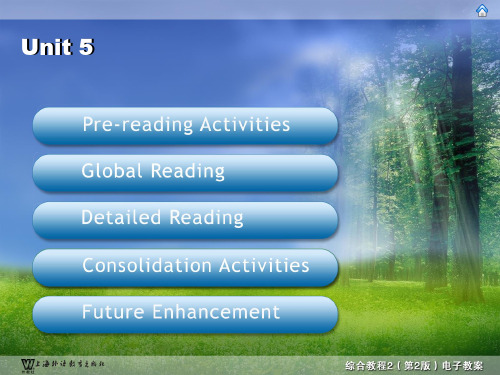
the great Civil War hero General Nathan Bedford Forrest. She said we was related to him in some way. What he did was, he started up this club called the Ku Klux Klan. They’d all
Voiceover: Mama always had a way of explaining things so I could understand them.
Audiovisual supplement Cultural information
Quote
I am quite often asked: How do you feel about having ALS? The answer is, not a lot. I try to lead as normal a life as possible, and not think about my condition, or regret the things it prevents me from doing, which are not that many.
— Stephen Hawking
Main idea
Structural analysis
It is hard to imagine that a blind old man should be willing and able to f_i_x__a__c_a_r_ for someone else on a d__a_r_k__ s_t_o__r_m__y_ night. This happened to the author, a c__r_ip__p_l_e_d_ man who was afflicted by a progressive disease and who took others’ h__e_l_p_ for granted. Up to that day, the author had lived in d__i_s_il_l_u_s_i_o_n_m__e__n_t_,_s_e__lf_-_p__it_y_,__in__d_i_f_fe__r_e_n_c__e__a_n_d__ s_e__lf_i_s_h_n__e_s_s_ , as he was becoming increasingly feeble. He struggled to c__li_m__b__t_h_e__f_o__u_r_t_e_e_n___st_e__p_s_ every day only to hold on to his sanity, his wife, his home and his job.
unit5 fourteen steps

Helen Keller
a symbol of courage in the face of overwhelming odds, a woman of luminous intelligence, high ambition and great accomplishment. She devoted her life to helping others.
"The world is full of trouble, but as long as we have people undoing trouble, we have a pretty good world." —Helen Keller
the second Sunday in May is Mother’s Day But do you know, what day it is the third Sunday in May?
1. Life was like a box of chocolates, you never know what you’re gonna get. (生命就像 一盒巧克力,结果往往出人意料) 2. Stupid is as stupid does. (蠢人做蠢事,也 可理解为傻人有傻福) 3. Miracles happen every day. (奇迹每天都在 发生) 4. Jenny and I was like peas and carrots.(我 和珍妮形影不离) 5. Have you given any thought to your future?(你有没有为将来打算过呢ing. The Bible
To enter or pass into
Unit 5 Fourteen steps(课堂PPT)
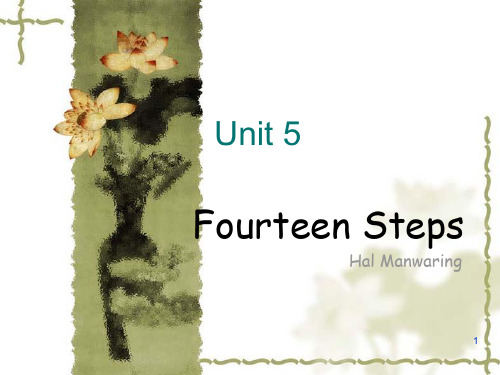
Part I (Para 1 – 2)
The author’s first life
Questions
Can you describe the author’s first life briefly?
be inclined to
Commandos are inclined to shoot first and ask questions later.
Fat Cat
指有钱人
Cat tongue 形容怕烫、不能吃热食物的人
关于猫的谚语
不要非在一棵树上吊死
There are more ways of killing a cat than by choking it with cream.
知人知面不知心
Cats hide their claws. 嘲笑那些掩耳盗铃者。
The 21 dancers in “The Thousand-hand Bodhisattva” amazed and delight the word who can speak and hear.
Kirk Douglas’ wife Ann still established Research for Women’ cancers with six fellow survivors even when she dealt with the cancer.
Keys
1. nine 2. fifteen 3. motor nerves 4. flat 5. blind 6. self-pity / selfishness / indifference
/ thoughtlessness
Pre-reading questions
Unit5FourteenSteps课文翻译综合教程二(20200702124818)
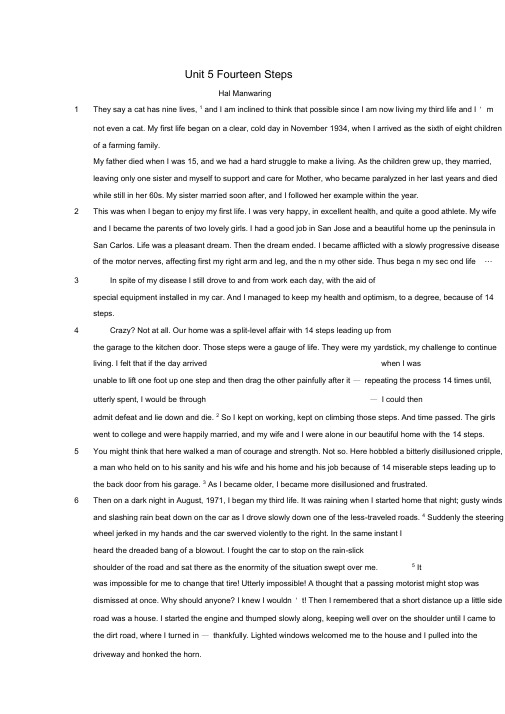
Unit 5 Fourteen StepsHal Manwaring1 They say a cat has nine lives, 1 and I am inclined to think that possible since I am now living my third life and I ' mnot even a cat. My first life began on a clear, cold day in November 1934, when I arrived as the sixth of eight children of a farming family.My father died when I was 15, and we had a hard struggle to make a living. As the children grew up, they married, leaving only one sister and myself to support and care for Mother, who became paralyzed in her last years and died while still in her 60s. My sister married soon after, and I followed her example within the year.2 This was when I began to enjoy my first life. I was very happy, in excellent health, and quite a good athlete. My wifeand I became the parents of two lovely girls. I had a good job in San Jose and a beautiful home up the peninsula in San Carlos. Life was a pleasant dream. Then the dream ended. I became afflicted with a slowly progressive disease of the motor nerves, affecting first my right arm and leg, and the n my other side. Thus bega n my sec ond life …3 In spite of my disease I still drove to and from work each day, with the aid ofspecial equipment installed in my car. And I managed to keep my health and optimism, to a degree, because of 14 steps.4 Crazy? Not at all. Our home was a split-level affair with 14 steps leading up fromthe garage to the kitchen door. Those steps were a gauge of life. They were my yardstick, my challenge to continue living. I felt that if the day arrived when I wasunable to lift one foot up one step and then drag the other painfully after it —repeating the process 14 times until, utterly spent, I would be through —I could thenadmit defeat and lie down and die. 2 So I kept on working, kept on climbing those steps. And time passed. The girls went to college and were happily married, and my wife and I were alone in our beautiful home with the 14 steps.5 You might think that here walked a man of courage and strength. Not so. Here hobbled a bitterly disillusioned cripple,a man who held on to his sanity and his wife and his home and his job because of 14 miserable steps leading up tothe back door from his garage. 3 As I became older, I became more disillusioned and frustrated.6 Then on a dark night in August, 1971, I began my third life. It was raining when I started home that night; gusty windsand slashing rain beat down on the car as I drove slowly down one of the less-traveled roads. 4 Suddenly the steering wheel jerked in my hands and the car swerved violently to the right. In the same instant Iheard the dreaded bang of a blowout. I fought the car to stop on the rain-slickshoulder of the road and sat there as the enormity of the situation swept over me. 5 Itwas impossible for me to change that tire! Utterly impossible! A thought that a passing motorist might stop wasdismissed at once. Why should anyone? I knew I wouldn ' t! Then I remembered that a short distance up a little side road was a house. I started the engine and thumped slowly along, keeping well over on the shoulder until I came to the dirt road, where I turned in —thankfully. Lighted windows welcomed me to the house and I pulled into thedriveway and honked the horn.7 The door opened and a little girl stood there, peering at me. I rolled down thewindow and called out that I had a flat tire and needed someone to change it for me because I had a crutch and couldn 'dto it myself. She went into the house and a moment later came out bundled in raincoat and hat, followed bya man who called a cheerful greeting. I sat there comfortable and dry, and felt a bit sorry for the man and the little girlworking so hard in the storm. Well, I would pay them for it. The rain seemed to be slackening a bit now, and I rolled down the window all the way to watch. It seemed to me that they were awfully slow and I was beginning to become impatient. I heard the clank of metal from the back of the car and the little girl ' s voice came clearly to me. “ Here ' s -t h eanjadclek, Grandpa. ” She was answered by the murmur o f the man ' s lower voice and the slow tilting of the car as it was jacked up. 6 There followed a long interval of noises, jolts and low conversation from the back of the car, but finally it was done. I felt the car bump as the jack was removed, and I heard the slam of the truck lid, and then they were standing at my car window.8 He was an old man, stooped and frail-looking under his slicker. The little girl was about eight or ten, I judged, with amerry face and a wide smile as she looked up at me. He said , “ This is a bad night for car trouble, but you ' re all set now. ” “ ThanI said. “ How much do I owe you? ” He shook his head. “ Nothing. Cynthia told me youwere a cripple —on crutches. Glad to be of help. I know you ' d do the same for me.There ' s no charge, friend. ” I held ou-tdaolflaivrebill. “ No! I like to pay my way. ” Hemade no effort to take it and the little girl stepped closer to the window and said quietly, “ Grandpa can ' t see it. ”9 In the next few frozen seconds the shame and horror of that moment penetratedand I was sick with an intensity I had never felt before. 7 A blind man and a child! Fumbling, feeling with cold, wet fingers for bolts and tools in the dark —a darkness that for him would probably never end until death. I don ' t orewmleomngbeI rsahtthere after they said good night and left me, but it was long enough for me to search deep within myself and find some disturbing traits. I realized that I was filled tooverflowing with self-pity, selfishness, indifferenee to the needs of others andthoughtlessness. 8 I sat there and said a prayer.10 “ Therefore all things whatsoever ye would that men should do to you, do ye evenso to them: for this is the law and the prophets. 9'To me now, mon ths later, thisScriptural admonition is more than just a passage in the Bible. It is a way of life, onethat I am trying to follow. It isn ' t always easy. Sometimes it is frustrating, sometimesexpe nsive in both time and mon ey, but the value is there. I am trying now not only toclimb 14 steps each day, but in my small way to help others. Someday, perhaps, I willeha nge a tire for a bli nd man in a car —some one as bli nd as I had bee n.14级台阶人们说猫有9条命,我倾向于认为这是可能的,因为我现在活的是第三次生命,而我不是猫。
新世纪综合英语第二版unit5fourteensteps教案
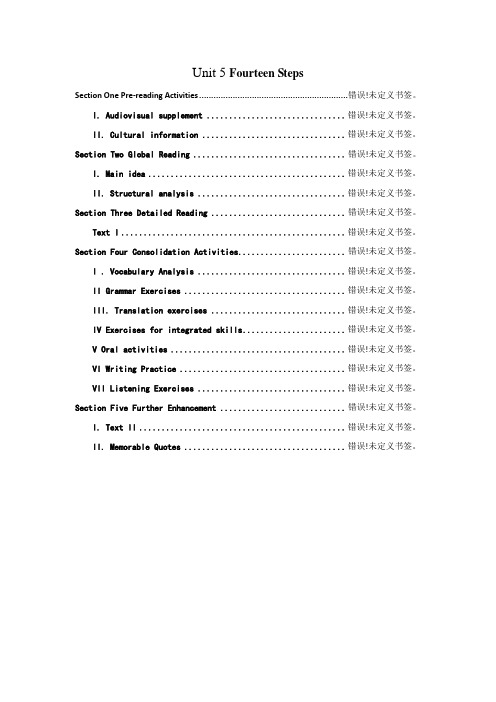
Unit 5 Fourteen StepsSection One Pre-reading Activities ..............................................................错误!未定义书签。
I. Audiovisual supplement ............................... 错误!未定义书签。
II. Cultural information ................................ 错误!未定义书签。
Section Two Global Reading .................................. 错误!未定义书签。
I. Main idea ............................................ 错误!未定义书签。
II. Structural analysis ................................. 错误!未定义书签。
Section Three Detailed Reading .............................. 错误!未定义书签。
Text I .................................................. 错误!未定义书签。
Section Four Consolidation Activities ........................ 错误!未定义书签。
I . Vocabulary Analysis ................................. 错误!未定义书签。
II Grammar Exercises .................................... 错误!未定义书签。
III. Translation exercises .............................. 错误!未定义书签。
Unit 5 Fourteen Steps课文翻译综合教程二

Unit 5 Fourteen StepsHal Manwaring1They say a cat has nine lives,1 and I am inclined to think that possible since I am now living my third life and I’m not even a cat. My first life began on a clear, cold day in November 1934, when I arrived as the sixth of eight children of a farming family. My father died when I was 15, and we had a hard struggle to make a living. As the children grew up, they married, leaving only one sister and myself to support and care for Mother, who became paralyzed in her last years and died while still in her 60s. My sister married soon after, and I followed her example within the year.2This was when I began to enjoy my first life. I was very happy, in excellent health, and quite a good athlete. My wife and I became the parents of two lovely girls. I had a good job in San Jose and a beautiful home up the peninsula in San Carlos. Life was a pleasant dream.Then the dream ended. I became afflicted with a slowly progressive disease of the motor nerves, affecting first my right arm and leg, and then my other side. Thus began my second life …3In spite of my disease I still drove to and from work each day, with the aid of special equipment installed in my car. And I managed to keep my health and optimism, to a degree, because of 14 steps.4Crazy? Not at all. Our home was a split-level affair with 14 steps leading up from the garage to the kitchen door. Those steps were a gauge of life. They were my yardstick, my challenge to continue living. I felt that if the day arrived when I was unable to lift one foot up one step and then drag the other painfully after it — repeating the process 14 times until, utterly spent, I would be through — I could then admit defeat and lie down and die.2 So I kept on working, kept on climbing those steps. And time passed. The girls went to college and were happily married, and my wife and I were alone in our beautiful home with the 14 steps.5You might think that here walked a man of courage and strength. Not so. Here hobbled a bitterly disillusioned cripple, a man who held on to his sanity and his wife and his home and his job because of 14 miserable steps leading up to the back door from his garage.3As I became older, I became more disillusioned and frustrated.6Then on a dark night in August, 1971, I began my third life. It was raining when I started home that night; gusty winds and slashing rain beat down on the car as I drove slowly down one of the less-traveled roads.4 Suddenly the steering wheel jerked in my hands and the carswerved violently to the right. In the same instant I heard the dreaded bang of a blowout. I fought the car to stop on the rain-slick shoulder of the road and sat there as the enormity of the situation swept over me.5It was impossible for me to change that tire! Utterly impossible! A thought that a passing motorist might stop was dismissed at once. Why should anyone? I knew I wouldn’t! Then I remembered that a short distance up a little side road was a house. I started the engine and thumped slowly along, keeping well over on the shoulder until I came to the dirt road, where I turned in —thankfully. Lighted windows welcomed me to the house and I pulled into the driveway and honked the horn.7The door opened and a little girl stood there, peering at me. I rolled down the window and called out that I had a flat tire and needed someone to change it for me because I had a crutch and couldn’t do it myself. She went into the house and a mom ent later came out bundled in raincoat and hat, followed by a man who called a cheerful greeting. I sat there comfortable and dry, and felt a bit sorry for the man and the little girl working so hard in the storm. Well, I would pay them for it. The rain seemed to be slackening a bit now, and I rolled down the window all the way to watch. It seemed to me that they were awfully slow and I was beginning to become impatient. I heard the clank of metal from the back of the car and the little girl’s voice came clearly to me. “Here’s the jack-handle, Grandpa.” She was answered by the murmur of the man’s lower voice and the slow tilting of the car as it was jacked up.6There followed a long interval of noises, jolts and low conversation from the back of the car, but finally it was done. I felt the car bump as the jack was removed, and I heard the slam of the truck lid, and then they were standing at my car window.8He was an old man, stooped and frail-looking under his slicker. The little girl was about eight or ten, I judged, with a merry face and a wide smile as she looked up at me. He said, “This is a bad night for car trouble, but you’re all set now.” “Thanks,” I said. “How much do I owe you?” He shook his head. “Nothing. Cynthia told me you were a cripple —on crutches.Glad to be of help. I know you’d do the same for me. There’s no charge, friend.” I held out a five-dollar bill. “No! I like to pay my way.” He made no effort to take it and the little girl stepped closer to the window and said quietly, “Grandpa can’t see it.”9In the next few frozen seconds the shame and horror of that moment penetrated and I was sick with an intensity I had never felt before.7 A blind man and a child! Fumbling, feeling with cold, wet fingers for bolts and tools in the dark —a darkness that for him would probably never end until death. I don’t remember how long I sat there after they said good night and left me, but it was long enough for me to search deep within myself and find some disturbing traits. I realized that I was filled to overflowing with self-pity, selfishness, indifference to the needs of others and thoughtlessness.8 I sat there and said a prayer.10“Therefore all things whatsoever ye would that men should do to you, do ye even so to them: for this is the law an d the prophets.”9To me now, months later, this Scriptural admonition is more than just a passage in the Bible. It is a way of life, one that I am trying to follow. It isn’t always easy. Sometimes it is frustrating, sometimes expensive in both time and money, but the value is there. I am trying now not only to climb 14 steps each day, but in my small way to help others. Someday, perhaps, I will change a tire for a blind man in a car — someone as blind as I had been.14级台阶人们说猫有9条命, 我倾向于认为这是可能的, 因为我现在活的是第三次生命, 而我不是猫。
Unit 5 Fourteen Steps课文翻译综合教程二培训讲学
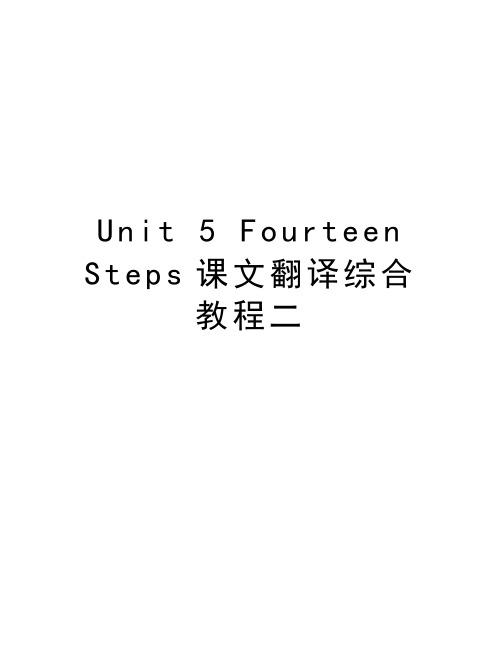
U n i t5F o u r t e e n S t e p s课文翻译综合教程二Unit 5 Fourteen StepsHal Manwaring1 They say a cat has nine lives,1 and I am inclined to think that possiblesince I am now living my third life and I’m not even a cat. My first lifebegan on a clear, cold day in November 1934, when I arrived as the sixth of eight children of a farming family. My father died when I was 15, and we had a hard struggle to make a living. As the children grew up, theymarried, leaving only one sister and myself to support and care for Mother, who became paralyzed in her last years and died while still in her 60s. My sister married soon after, and I followed her example within the year.2 This was when I began to enjoy my first life. I was very happy, inexcellent health, and quite a good athlete. My wife and I became theparents of two lovely girls. I had a good job in San Jose and a beautifulhome up the peninsula in San Carlos. Life was a pleasant dream. Then the dream ended. I became afflicted with a slowly progressive disease of the motor nerves, affecting first my right arm and leg, and then my other side.Thus began my second life …3 In spite of my disease I still drove to and from work each day, with theaid of special equipment installed in my car. And I managed to keep my health and optimism, to a degree, because of 14 steps.4 Crazy? Not at all. Our home was a split-level affair with 14 steps leadingup from the garage to the kitchen door. Those steps were a gauge of life.They were my yardstick, my challenge to continue living. I felt that if the day arrived when I was unable to lift one foot up one step and then drag the other painfully after it — repeating the process 14 times until, utterly spent, I would be through — I could then admit defeat and lie down and die.2 So I kept on working, kept on climbing those steps. And time passed.The girls went to college and were happily married, and my wife and Iwere alone in our beautiful home with the 14 steps.5 You might think that here walked a man of courage and strength. Not so.Here hobbled a bitterly disillusioned cripple, a man who held on to hissanity and his wife and his home and his job because of 14 miserable steps leading up to the back door from his garage.3 As I became older, I became more disillusioned and frustrated.6 Then on a dark night in August, 1971, I began my third life. It wasraining when I started home that night; gusty winds and slashing rainbeat down on the car as I drove slowly down one of the less-traveledroads.4 Suddenly the steering wheel jerked in my hands and the carswerved violently to the right. In the same instant I heard the dreadedbang of a blowout. I fought the car to stop on the rain-slick shoulder of the road and sat there as the enormity of the situation swept over me.5 It was impossible for me to change that tire! Utterly impossible! A thought that a passing motorist might stop was dismissed at once. Why should anyone? I knew I wouldn’t! Then I remembered that a short distance up a little side road was a house. I started the engine and thumped slowly along, keeping well over on the shoulder until I came to the dirt road, where I turned in — thankfully. Lighted windows welcomed me to the house and I pulled into the driveway and honked the horn.7 The door opened and a little girl stood there, peering at me. I rolled down thewindow and called out that I had a flat tire and needed someone to change it for me because I had a crutch and couldn’t do it myself. She went into the house and a moment later came out bundled in raincoat and hat, followed by a man who called a cheerful greeting. I sat there comfortable and dry, and felt a bit sorry for the man and the little girl working so hard in the storm. Well, I would pay them for it. The rain seemed to be slackening a bit now, and I rolled down the window all the way to watch. It seemed to me that they were awfully slow and I was beginning to become impatient. I heard the clank of metal from the back of the car and the little girl’s voice came clearly to me. “Here’s the jack-handle, Grandp a.” She was answered by the murmur of the man’s lower voice and the slow tilting of the car as it was jacked up.6There followed a long interval of noises, jolts and low conversation from the back of the car, but finally it was done. I felt the car bump as the jack was removed, and I heard the slam of the truck lid, and then they were standing at my car window.8 He was an old man, stooped and frail-looking under his slicker. The little girl wasabout eight or ten, I judged, with a merry face and a wide smile as she looked up at me. He said, “This is a bad night for car trouble, but you’re all set now.” “Thanks,” I said. “How much do I owe you?” He shook his head. “Nothing. Cynthia told me you were a cripple —on crutches. Glad to be of help. I know you’d do the same for me.There’s no charge, friend.” I held out a five-dollar bill. “No! I like to pay my way.” He made no effort to take it and the little girl stepped closer to the window and saidquietly, “Grandpa can’t see it.”9 In the next few frozen seconds the shame and horror of that moment penetratedand I was sick with an intensity I had never felt before.7 A blind man and a child!Fumbling, feeling with cold, wet fingers for bolts and tools in the dark — a darkness that for him would probably never end until death. I don’t remember how long I sat there after they said good night and left me, but it was long enough for me to search deep within myself and find some disturbing traits. I realized that I was filled to overflowing with self-pity, selfishness, indifference to the needs of others and thoughtlessness.8 I sat there and said a prayer.10“Therefore all things whatsoever ye would that men should do to you, do ye even so to them: for this is the law and the prophets.”9To me now, months later, this Scriptural admonition is more than just a passage in the Bible. It is a way of life, one that I am trying to follow. It isn’t always easy. Sometimes it is frustrating, sometimes expensive in both time and money, but the value is there. I am trying now not only to climb 14 steps each day, but in my small way to help others. Someday, perhaps, I will change a tire for a blind man in a car — someone as blind as I had been.14级台阶人们说猫有9条命, 我倾向于认为这是可能的, 因为我现在活的是第三次生命, 而我不是猫。
- 1、下载文档前请自行甄别文档内容的完整性,平台不提供额外的编辑、内容补充、找答案等附加服务。
- 2、"仅部分预览"的文档,不可在线预览部分如存在完整性等问题,可反馈申请退款(可完整预览的文档不适用该条件!)。
- 3、如文档侵犯您的权益,请联系客服反馈,我们会尽快为您处理(人工客服工作时间:9:00-18:30)。
Main idIt is hard to imagine that a blind old man should be willing and able to fix a car for someone else on a dark _________ ______ stormy night. This happened to the author, a crippled ________ _________ man who was afflicted by a progressive disease and who took others’ _____ for granted. Up to that day, the author help had lived in disillusionment, self-pity, indifference and _______________________________________________ selfishness ____________ , as he was becoming increasingly feeble. He struggled to ___________________________ every day only to climb the fourteen steps hold on to his sanity, his wife, his home and his job.
Unit 5
Audiovisual supplement
Cultural information
Watch the video and answer the following questions. 1. What did the mother mean at the end of the video ? She was trying to tell her boy that everybody should be treated equally, even for those who had some physical or intelligence problems.
Audiovisual supplement
Cultural information
better than you, Forrest. If God intended everybody to be the same, he’d have given us all braces on our legs. Voiceover: Mama always had a way of explaining things so I could understand them. Mother:
Main idea
Structural analysis
Paragraphs 3-5
Main idea The author describes his second life. Because of his disease, he became miserable and frustrated. The author’s third life began with the trouble of his car on the stormy night and he described the blind man’s magnanimous, selfless help. The author reflected on the incident and his life philosophy, from which he discovered the true value of life.
Audiovisual supplement
Cultural information
2. What do you know about the movie Forrest Gump? Forrest Gump is a 1994 film based on Winston Groom’s 1986 novel of the same name. The film, directed by Robert Zemeckis, stars Tom Hanks, Robin Wright Penn, and Gary Sinise. The story is of Forrest Gump, an ordinary man who comes from Alabama and his journey through life meeting historical figures, influencing popular culture, and experiencing firsthand historic events of the late 20th century.
6-8
9-10
Detailed reading
Fourteen Steps Hal Manwaring They say a cat has nine lives, and I am inclined to 1 think that possible since I am now living my third life and I’m not even a cat. My first life began on a clear, cold day in November 1934, when I arrived as the sixth of eight children of a farming family. My father died when I was 15, and we had a hard struggle to make a living. As the children grew up, they married, leaving only one sister and myself to support and care for Mother, who became paralyzed in her last years and died while still in her 60s. My sister married soon after, and I followed her example within the year.
Audiovisual supplement
Cultural information
Audiovisual supplement
Cultural information
Let’s take a little walk around. How do those feel? His legs are strong, Mrs. Gump, as strong as I’ve ever seen. But his back’s as crooked as a politician. But we’re going to straighten him right up, aren’t we, Forrest? Mother: Forrest! Voiceover: Now, when I was a baby, Mama named me after the great Civil War hero General Nathan Bedford Forrest. She said we was related to him in some way. What he did was, he started up this club called the Ku Klux Klan. They’d all Doctor:
Main idea
Structural analysis
After he met the blind old man, it suddenly dawned on him that even a handicapped person was capable of ______________ performing _______________ for his fellow beings, and that an act of love was where _________________ lies. the value of life
Main idea
Structural analysis
1. How many parts can the text be divided into and what’s the topic of each part? According to the development of the story, the text could be divided into four parts, each of which focuses on one topic. Respectively, these topics are about the author’s first life, his second life, his third life and his reflection on the auto-repair incident.
Audiovisual supplement
Cultural information
Voiceover: dress up in their robes and their bedsheets and act like a bunch of ghosts or spooks or something. They’d even put bedsheets on their horses and ride around. Anyway, that’s how I got my name — Forrest Gump. Mama said the Forrest part was to remind me that sometimes we all do things that, well, that just don’t make no sense. Mother: All right. What are y’all staring at? Haven’t you ever seen a little boy with braces on his legs before? Don’t ever let anybody tell you they’re
